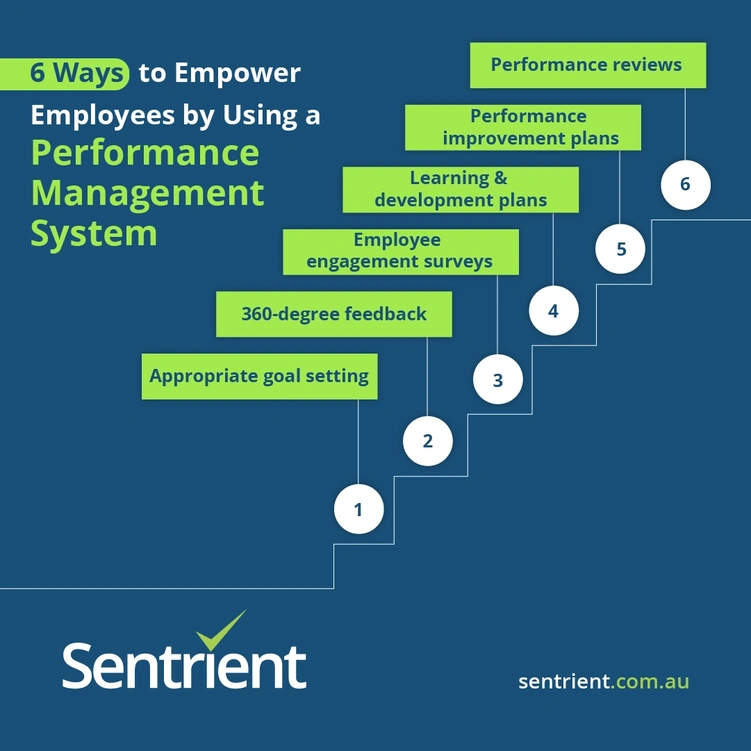Performance management is often only linked to annual review meetings, remunerations, and terminations; however, there are many more benefits. When implemented properly, a performance management system can help you empower your employees by providing them with the right platform to voice their opinions, allowing training for skills development, and increasing their own performance and skills.
You can also build a sense of belonging and ownership for your workforce, which proves useful in reinforcing good work and encouraging improvement.
Let us have a look at how an advanced and adaptive performance management system can help you target growth and employee retention.
6 Ways to Empower Employees by Using a Performance Management System

1. Appropriate goal setting
One of the basic requirements for performance management is setting clear goals. Your managers generally assess employee performance based on these goals. Unless you create goals that are measurable, specific, and time-bound, your employees will be judged unfairly. Goals need to be relevant to the current business context. Unrealistic goals are responsible for creating an environment of anxiety and increasing employee burnout.
When done right, goals empower your employees by providing them with clear boundaries to operate within and reducing gaps between managers and the employees who report to them. Businesses can also practise allowing employees to set their own goals, which are in line with organisational strategy. Most importantly, this method makes employees feel in charge of their role and their success in your organisation.
2. 360-degree feedback
360-degree feedback is a powerful approach to gathering employee feedback. It focuses on employee behaviour more than their performance per se. 360-degree feedback is an innovative way to listen to the opinions of every employee rather than only the manager’s feedback. Traditional feedback systems rely on a manager’s viewpoint, but now, you can empower all your employees to raise concerns that need resolving. Employees can be free from any workplace bias and feel empowered as their voice is heard.
360-degree feedback is also important for an organisation as it enables all-around information collection.
3. Employee engagement surveys
Employee engagement surveys are crucial for keeping your employees motivated. Engaged employees strive to work hard and are happy to see their organisation succeed.
Employee engagement surveys help you understand and resolve any gaps, issues or improvements required in your employee management practices. It is also a way of empowering your employees by letting them know that their opinion matters and that the organisation is willing to make necessary changes that can improve employee engagement.
4. Learning and development plans
Any feedback or survey should focus on obtaining information about the areas where an employee might need training or skillset improvement. Providing the right opportunity for employees to enhance existing skills and learn new skills can be the key to their success. Managers can also contribute to designing learning and development plans for their direct reports, provide the required feedback and compare training undergone by an employee’s peers. An innovative performance management system helps you with organising learning and development plans for individual employees. Training can be arranged online, one-to-one, by department or organisation.
Increasing an employee’s skillset is investing towards the success and development of your organisation by empowering your workforce. A skilled employee who feels empowered by having the opportunity to grow with an organisation is more likely to be retained and work more effectively.
5. Performance improvement plans
Performance improvement plans are clear roadmaps of how and where an employee should progress in terms of their performance. It is a formal way of planning the performance improvement of an employee where a manager and employee sit down to discuss their progress and the areas they need to improve. If not done correctly, it can create a negative impact on your employees as they may feel the plan is enforced on them rather than being designed in line with their best interests.
Businesses can empower employees by allowing them to create their own performance improvement plans based on the key issues that were identified after meeting with their managers. Managers can later review and approve these plans, allowing employees to follow them according to the timeline agreed upon.
6. Performance reviews
By implementing performance improvement plans, you can assess employee performance more regularly and not just rely on annual review meetings. Continuous feedback, surveys, and communication contribute to creating an unbiased employee performance assessment method that enables employee satisfaction and retention. With this performance review process in place, businesses can respond more proactively to issues and empower employees, managers, and leaders to work together to achieve mutual goals that are in line with organisational strategy.
By implementing an effective performance management system for your organisation, you can make performance management a well-informed, unbiased, and ongoing process that is focused on overall growth. Employees feel more confident and empowered when they know the performance review meetings are not going to be based on information gathered from a single source.
Performance management focused on development is fundamental to empowering the workforce of any organisation. If you haven’t yet implemented a performance management system, contact Sentrient right away.
Do not let your employees feel undermined any longer, call Sentrient for a demo today!
Read More About Performance Management:
- How to Improve Your Work Culture by Using a 360 Degree Feedback System
- 6 Ways to Empower Employees by Using a Performance Management System
- 5 Ways to Improve Team Efficiency with A 360 Degree Feedback System
- 6 Effective Performance Management Trends During Covid-19
- The Impact of COVID on Performance Management Practices





